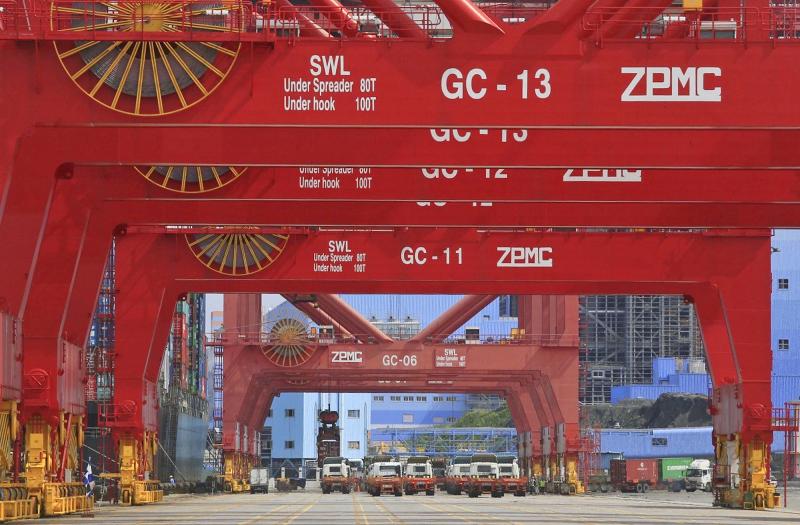Export orders last month tumbled 5.5 percent year-on-year to US$51.9 billion as lockdowns in major Chinese cities weakened demand for most categories, the Ministry of Economic Affairs said yesterday.
It is the first time in two years that the gauge of actual shipments in the following one to three months has slipped into contraction, which was induced by supply chain bottlenecks after China halted business activity in Shanghai and Kunshan, home to major manufacturing facilities of Taiwanese companies.
Department of Statistics Director Huang Yu-ling (黃于玲) said export orders this month might decline by US$51.7 billion to US$53.2 billion, or a 1.1 percent decline to a 1.7 percent uptick, after China this week introduced gradual reopenings.

Photo: CNA
The slowdown is most conspicuous for information and communications products, which slumped 21.5 percent to US$1.21 billion as sales for laptops and smartphones floundered, Huang said.
The ominous cyclical movement came after the US and Europe opted to coexist with COVID-19, and showed less dependence on remote working and schooling products, the ministry said in a report.
The digital transformation has continued, fueling demand for networking devices and severs, it said.
That helped explain why export orders for electronics bucked the downtrend with a 4.3 percent increase as demand in the US and in Southeast Asian markets remained strong, although it slackened in China, it said.
The lackluster showing in the Chinese market was probably due to supply chain disruptions, it said.
Orders for optical products were the most affected, with demand for flat panels used in TVs and personal computers faltering, putting pressure on selling prices, the statement said.
Demand for base metals and machinery equipment fell 8.8 percent and 11.6 percent respectively as customers in China, the US and other countries turned conservative about capital investment, the ministry said.
Export orders for plastic products dropped 7.3 percent as demand for disease prevention products subsided, it said.
Chemical products gained 14.5 percent, continuing to benefit from the war in Ukraine, which has pushed up international energy and petrochemical product prices, even as China’s lockdowns weighed on demand in some markets, it said.
Orders from the US, China, Europe and Japan softened by 0.2 percent to 17 percent, but picked up 22.7 percent in ASEAN markets, the ministry said in the statement.
Companies expect flattish business with a mild upside in order value for this month, the ministry’s survey showed.
For the first four months of this year, export orders totaled US$225.02 billion, an increase of 10.4 percent from the same period last year, it said.

Among the rows of vibrators, rubber torsos and leather harnesses at a Chinese sex toys exhibition in Shanghai this weekend, the beginnings of an artificial intelligence (AI)-driven shift in the industry quietly pulsed. China manufactures about 70 percent of the world’s sex toys, most of it the “hardware” on display at the fair — whether that be technicolor tentacled dildos or hyper-realistic personalized silicone dolls. Yet smart toys have been rising in popularity for some time. Many major European and US brands already offer tech-enhanced products that can enable long-distance love, monitor well-being and even bring people one step closer to

Malaysia’s leader yesterday announced plans to build a massive semiconductor design park, aiming to boost the Southeast Asian nation’s role in the global chip industry. A prominent player in the semiconductor industry for decades, Malaysia accounts for an estimated 13 percent of global back-end manufacturing, according to German tech giant Bosch. Now it wants to go beyond production and emerge as a chip design powerhouse too, Malaysian Prime Minister Anwar Ibrahim said. “I am pleased to announce the largest IC (integrated circuit) Design Park in Southeast Asia, that will house world-class anchor tenants and collaborate with global companies such as Arm [Holdings PLC],”

TRANSFORMATION: Taiwan is now home to the largest Google hardware research and development center outside of the US, thanks to the nation’s economic policies President Tsai Ing-wen (蔡英文) yesterday attended an event marking the opening of Google’s second hardware research and development (R&D) office in Taiwan, which was held at New Taipei City’s Banciao District (板橋). This signals Taiwan’s transformation into the world’s largest Google hardware research and development center outside of the US, validating the nation’s economic policy in the past eight years, she said. The “five plus two” innovative industries policy, “six core strategic industries” initiative and infrastructure projects have grown the national industry and established resilient supply chains that withstood the COVID-19 pandemic, Tsai said. Taiwan has improved investment conditions of the domestic economy

Sales in the retail, and food and beverage sectors last month continued to rise, increasing 0.7 percent and 13.6 percent respectively from a year earlier, setting record highs for the month of March, the Ministry of Economic Affairs said yesterday. Sales in the wholesale sector also grew last month by 4.6 annually, mainly due to the business opportunities for emerging applications related to artificial intelligence (AI) and high-performance computing technologies, the ministry said in a report. The ministry forecast that retail, and food and beverage sales this month would retain their growth momentum as the former would benefit from Tomb Sweeping Day